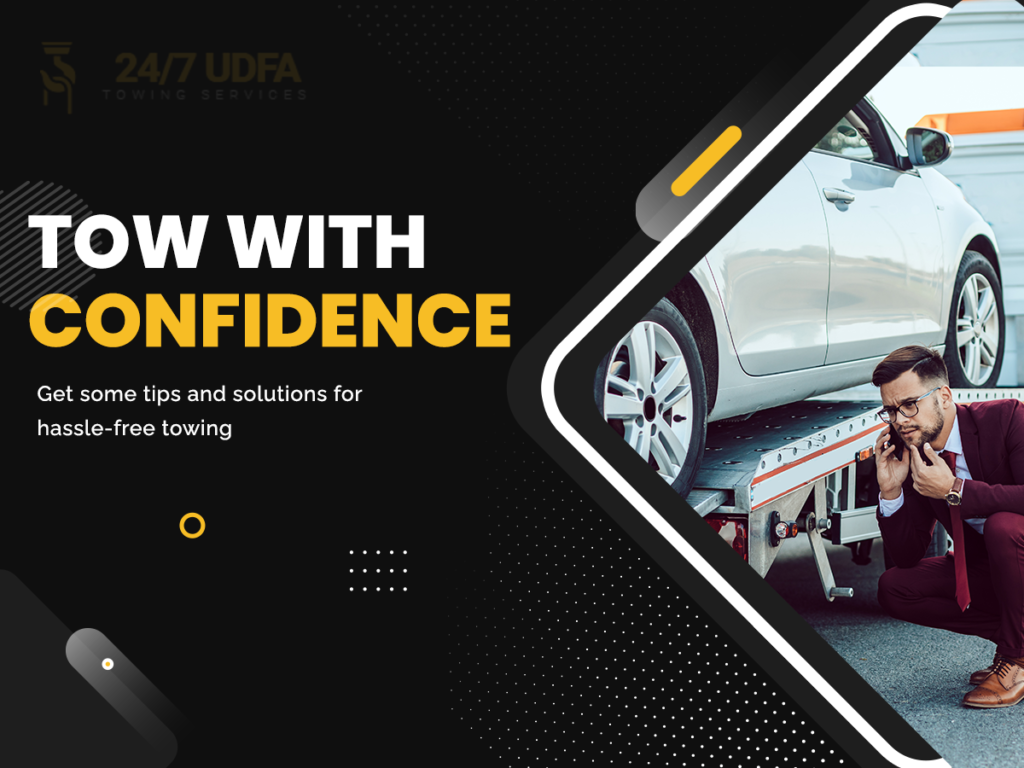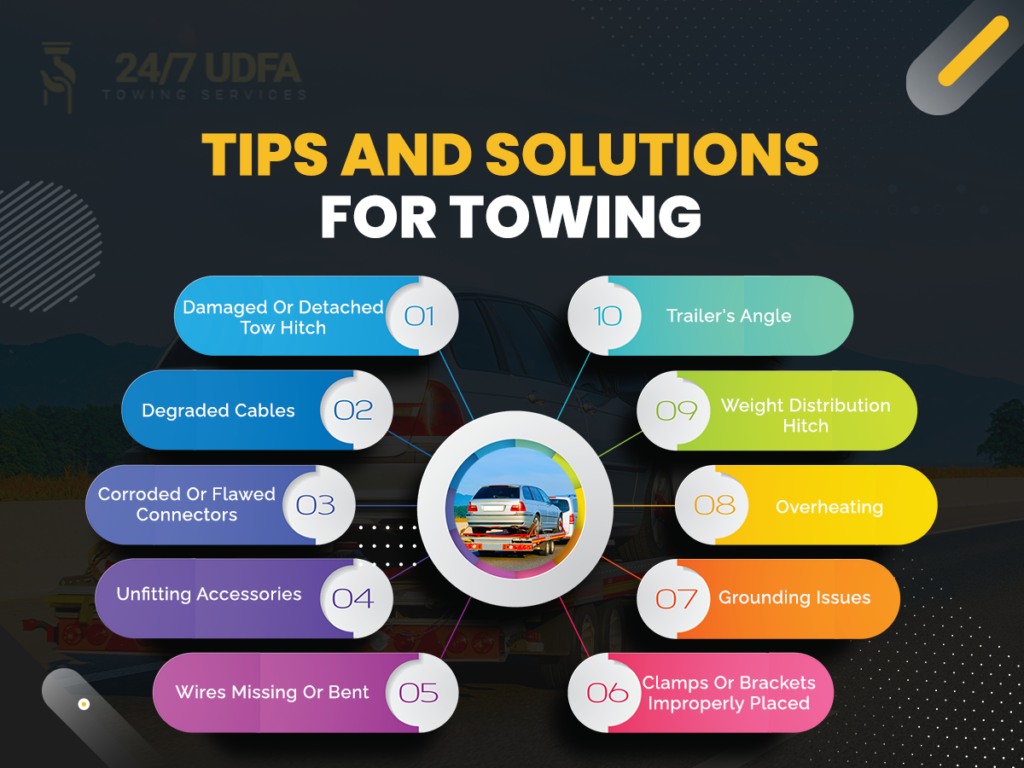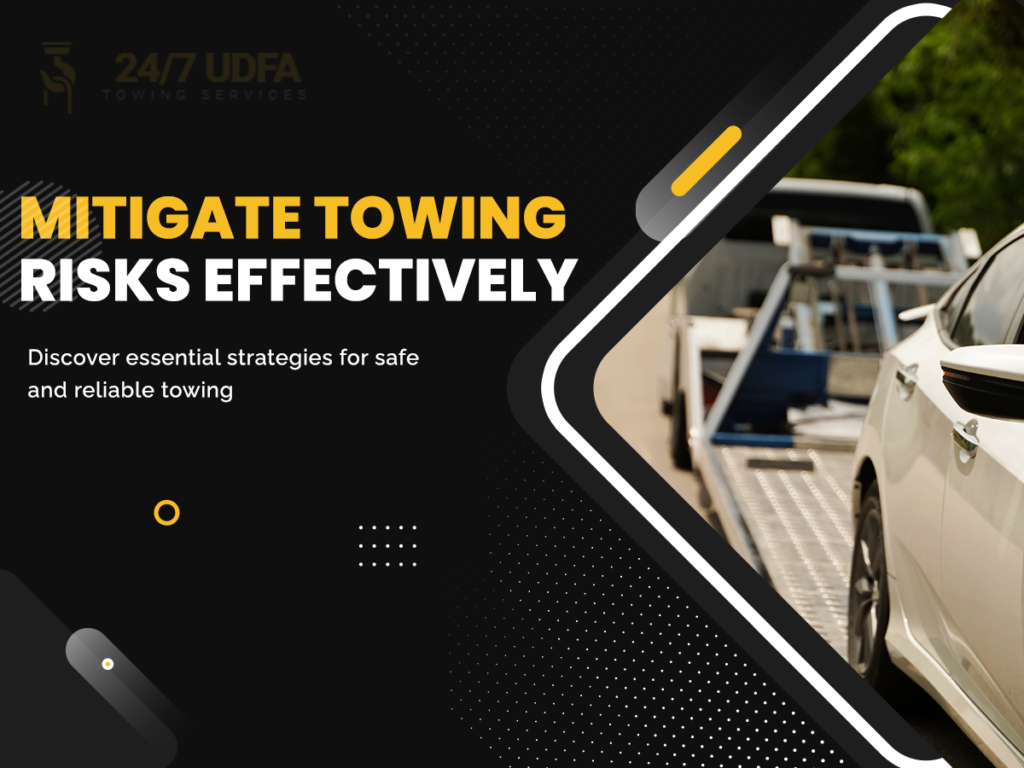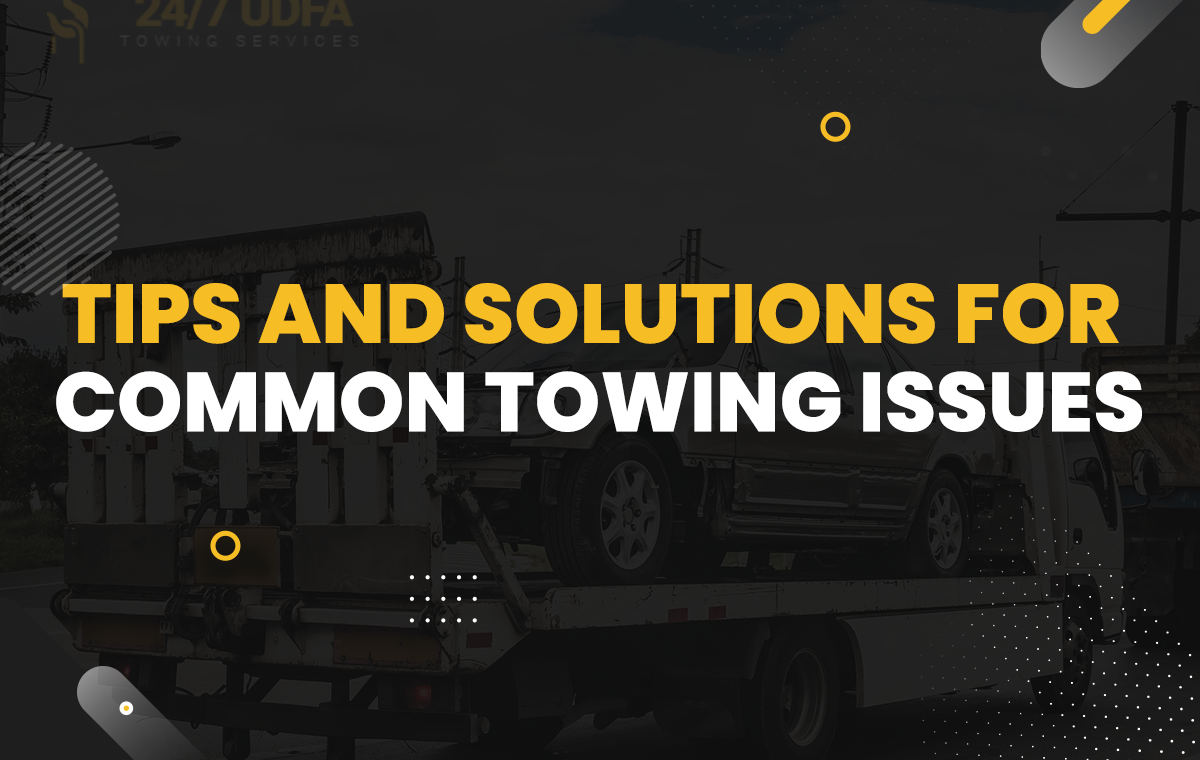Introduction
It may be a difficult and frustrating experience when issues arise throughout the towing process. Prioritising safety precautions and exercising care while towing are essential. If you ignore the slightest details, you could get a difficult ride or damage the weight you tow. A towing service will ensure your automobile is repaired immediately so you may resume driving. 24/7 UDFA will be equipped with everything needed to retrieve a car and bring it back on the road safely and efficiently. When drivers are helpless and trapped on the side of the road, they may contact towing service for professional assistance.
What does a towing company do?

Accidents and car problems are unanticipated. Taking action ensures you are always equipped to deal with such circumstances. A towing company will fix your car quickly so you can get back on the road. 24/7 UDFA is equipped with all the necessary tools and machinery to tow a car and fix it as quickly as feasible. 24/7 UDFA towing service provides a wide range of services, including cleaning up the site of an accident, changing flat tires, delivering fuel, moving large equipment, and many more.
Tips and solutions for towing

To prevent accidents, injuries, and car damage, tow safely. A vehicle must be hauled with precision. It involves attaching the towing vehicle to the towed vehicle using tow bars, ropes, tow dolly, or hitches. To tow a car securely, you must follow precise instructions and safety measures. Safety is crucial to hauling. If done incorrectly, hauling a car may be hazardous. Thus, precise protocols must be followed for safe and effective towing. Here are the tips and tricks for your towing solutions.
Damaged or detached tow hitch
A faulty or detached one might be stressful when attempting to attach a car with a tow hitch. Hauling a vehicle may result in slippage and uneven drag, which causes the vehicle to lose speed and momentum.
Solution
The most frequent reasons for a broken or disconnected tow hitch are old or damaged receiver, a damaged or misaligned towbar, and faulty wiring. Identifying the fundamental source of this issue is crucial to fix it. This is sometimes challenging since a damaged or detached tow hitch may be caused by various variables, such as the trailer and car’s age, wear, and usage. The tow hitch may need to be changed in specific circumstances.
Degraded cables
Damaged wires are one of the most frequent issues with towing equipment. There are several potential causes for worn-out wires. One possibility is that a cable has been damaged by roadside trash or some other roadside object. A cable coming loose from its vehicle connecting point is another scenario. Additionally, the cable may be harmed when a technician cuts or splices a cable while doing roadside maintenance.
Solution
All cables must be fitted and maintained correctly to prevent damage and provide a safe towing experience. Additionally, while connecting wires to trailers and other vehicles, it’s crucial to utilise high-quality connections and adapters. Swapping out faulty wires for new ones could be required in rare circumstances. These procedures may prevent broken or worn-out wires from creating problems on the road.
Corroded or flawed connectors
One of the most frequent issues with towing is faulty or damaged connections. These issues may happen when a connector malfunctions, rupturing the connection between two car parts. Cars are equipped with different connections, including vacuum and electrical ones. While electrical connections are often seen on new vehicles, vacuum connectors are more frequently employed in diesel and older gasoline-powered vehicles.
Solution
There are several steps you may take to analyse and resolve a towing issue if a broken or corroded connection has caused it. Start by looking for indications of electrical interference, such as inconsistent windscreen wiper action or flashing dashboard lights. Additionally, look for any indications of damage to the connection, such as rust or plastic housing splits. Last but not least, think about replacing the broken connection with a new one. If you follow these procedures, you can repair your towing issue and return to driving swiftly and safely.
Unfitting accessories
When mechanical equipment is not properly fixed or attached to the vehicle, it is said to have loose-fitting hardware. This might lead to issues with the car, such as loss of steering, handling, or braking power.
Solution
Vehicles may have a variety of loose-fitting gear, including bolts, nuts, and washers that do not fit tightly into their sockets do not have a secure grip on their threads, or do not rest level on surfaces. Another cause may be too-long or too-short belts with damaged or missing teeth. Gaskets that are either totally absent or overly tiny. When the brakes are engaged and released, they squeal. Wheels and tires that are difficult or difficult to turn owing to loose hubs or bearings. Check for the binding suspension parts that need to be able to move freely.
Wires missing or bent
Wires bent, missing, or damaged might cause frequent towing issues. These problems might happen if the wiring in your car becomes disconnected or damaged due to an electrical system failure. Accidents, crashes, and poor maintenance are the most frequent causes of damaged or destroyed vehicle wiring.
Solution
It’s crucial to know that twisted, missing, or broken wires don’t always mean your car’s electrical system is failing. If you feel that your car has an electrical problem, have a specialist inspect it. They’ll find and repair the issue.
Clamps or brackets improperly placed
Owners of towing vehicles often have difficulties with incorrectly fitted clamps or brackets and how to rectify them. These devices secure items during transportation, such as trailers, vehicles, or boats. Unfortunately, it is common for these fittings to become crooked or incorrectly placed, which may make it difficult to operate, demand too much power to turn or move an item, or even damage the vehicle.
Solution
The necessity for clear installation instructions from the clamp or bracket manufacturer may be one cause of this issue. If you use a clamp or bracket that is no longer manufactured or bought incorrectly, this could happen. When installing any clamp or bracket, it’s crucial to double-check the torque settings and installation methods. This will guarantee that the fixture is set up properly and securely.
Grounding issues
A typical problem that might affect the vehicle is a faulty ground connection when there are towing issues. It often results from an electrical connection or fuse that is broken or faulty. This might lead to inconsistent or poor battery charging in your car, which would affect performance or potentially cause the battery to die.
Solution
You must identify the cause of the weak ground connection and repair it to resolve this issue. This can include changing a fuse or electrical connection that is damaged or disconnected.
Overheating
The engine may overheat if you pull a car behind another. This particularly happens if the vehicle being towed is huge or far away.
Solution
Get your vehicle checked thoroughly for any necessary maintenance, focusing mainly on the cooling system, before you start towing your vehicle. In addition, towing issues should be avoided when the weather is very hot, and you should make frequent stops to let the engine cool down.
Weight distribution hitch
When towing more than 5,000 pounds, most cars need the installation of a weight-distribution hitch; When towing a heavy trailer, a weight-distribution hitch is always the best choice, particularly one with integrated sway control.
Solution
When using a load-leveling suspension, a weight-distribution hitch requires more time. It evenly distributes weight across all the tow vehicle and trailer axles when set up correctly. A weight-distribution hitch often offers better handling and greater braking capabilities. Because weight distribution is crucial, most manufacturers mandate using a weight-distributing hitch to maximise a vehicle’s towing capabilities.
Trailer’s angle
When towing, a trailer with more than one axle must be level. Ball mounts and trailer hitches that may be adjusted to the right height are useful.
Solution
Park the trailer on a level surface and measure the ground-to-frame distance at the front and rear. When the trailer is hitched, these measurements must match. A level trailer will provide uniform wear and weight distribution on the axles and tires and better trailer tracking behind the tow vehicle.
Risk management strategies in towing

Tow truck operators can mitigate these risks using risk-management measures. To begin, tow-truck operators assess their operations. Tow truck operators additionally use dash cameras and telematics to encourage safe driving and protect drivers. These technologies reduce court issues and accidents.
Get help anytime!
24/7 UDFA helps to identify their towing requirements and manage possible issues before they become problematic. The 24/7 UnDeFinedAuto team is skilled in towing solutions. Make a call to 24/7 UDFA if you have any queries or concerns related to towing. They can assist you in getting your car back on the road to happiness.

